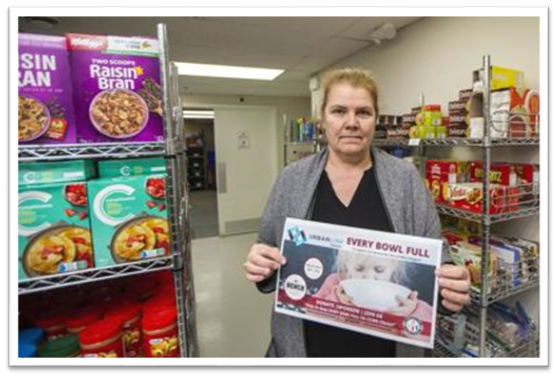There’s very little being done by government to assist people with food.”
Updated 20 hrs ago
April 10, 2025

Paula Barrett, manager of Feed Niagara, visits the food bank of Community Care of West Niagara in Beamsville, as food banks across the region continue to assist a growing number of families in need of assistance.
Bob Tymczyszyn/St. Catharines Standard
It’s being called a growing food emergency in Ontario, and Niagara’s escalating numbers associated with people turning to community shelves for pasta, peanut butter and other staples confirms that.
Jon Braithwaite, chief executive officer of The Hope Centre, said the need for food aid is startling as more and more people seek help putting dinner on the table.
He said “each month is a new record” in terms of the number of people turning to his Welland agency.
“March was the busiest month in the (50-year) history of The Hope Centre, but that just beat January, which beat November the year before,” he said.
“It’s just continues to increase. We had over 2,300 visits in March alone.”
At Community Care of St. Catharines and Thorold, 35,853 people were assisted in the first three months of the year, an increase of 11 per cent over the previous year.
“That’s pretty dramatic, it’s not going down, put it that way,” said chief executive officer Betty-Lou Souter.
Joanne Heritz, a Brock University adjunct professor, has researched trends in food bank use and growing food insecurity in Niagara.
She said people should be concerned.
Heritz, who authored the policy brief Sustaining Food Security in Niagara, said she found “an alarming growth in the number of residents in Niagara relying on food banks and food programs, and this trend does not show any signs of slowing down.”
“The alarm bells going off for me,” she said, is the fact there isn’t government intervention to address the issue.
“Historically, food banks were the responsibility of charities, and they still are. There’s very little being done by government to assist people with food.”
Several municipalities in Ontario are attempting to draw government attention to what has been called a growing food emergency.
Brantford city council in February declared a food emergency as it recognized one in six residents there experienced food insecurity and had insufficient income or relied on government assistance programs including Ontario Works, Ontario Disability Support Program and Old Age Security.
Paula Barrett, manager of Feed Niagara, said Mississauga, Toronto and Kingston have also formally drawn attention to issues faced by food banks in the province.
“(Those) three cities already did that (made a declaration) and … numbers (in Mississauga) were one in 13 citizens being supported by food banks,” she said.
“In Niagara Falls the number is one in seven residents being supported by food banks and in Port Colborne that number is one in eight, and it fluctuates in other municipalities in Niagara.”
Feed Niagara, a consortium of 10 food banks in the region that came together to address needs and pool resources, saw a “median average increase” in people accessing food banks of about 36 per cent between 2023 and 2024.
While about 33 per cent of food bank clients are children, Feed Niagara is seeing more single-parent households “juggling two income sources” requiring help.
Heritz said people’s ability to feed themselves is linked to stagnating incomes and the costly housing market.
“Most people experiencing increased food insecurity are renters,” she said. “The housing crisis has impacted people’s ability to provide food in their households.”
Barrett said the growing population seeing increasing food insecurity are people who are underemployed and those “not being paid a living wage.”
“There are a number of public policies that could address these gaps to help people using food banks,” she said.
Increasing Ontario Works and Ontario Disability Support Program rates would help relieve pressure on food banks, Barrett said, adding “between 33 and 38 per cent of the people using food banks are in receipt of ODSP.”
“The hope would be … public policy changes, so people didn’t fall through the cracks and require service,” she said.
“It’s concerning when a portion of the public relies on charity to provide a necessity for themselves and their family.”
“Whether it’s a declared emergency or not, it’s a concerning issue, even if one person needs to use a food bank, it’s something that should be top of mind for all levels of government.”

Matthew P. Barker is a St. Catharines-based general assignment reporter for the Standard.

